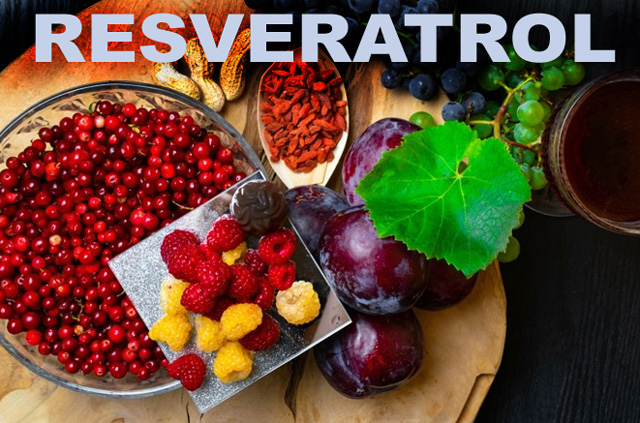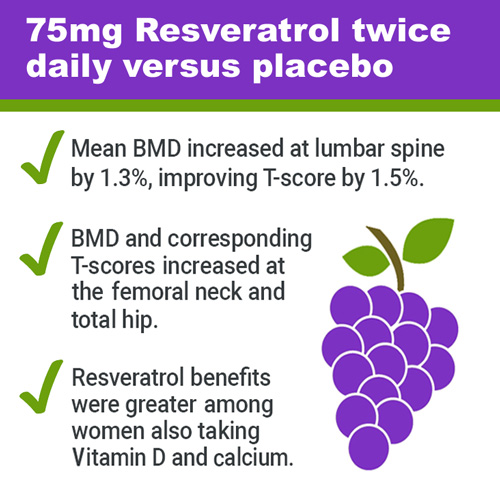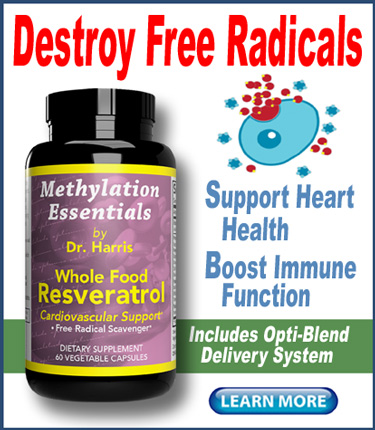Resveratrol is known for its ability to strengthern the immune system, improve cardiovascular health and support cognitive function. Now it appears improving bone health can be added to the growing list of benefits.
A new study has found that resveratrol’s propensity to benefit the microcirculation of blood to tissues in the human body was beneficial in improving bone mineral density in women suffering from osteoperosis.
The research was published in July in the Journal for Bone and Mineral Research.
The new study is one of many “sub-studies” expected to emerge from the larger long-term clinical trial called RESHAW.
RESHAW, which stands for Resveratrol Supporting Healthy Aging in Women, is being conducted in Australia at the University of Newcastle’s Clinical Nutrition Center.
RESHAW is the largest, longest-running study of its kind focusing on resveratrol. The long-term study is supported by the National Health and Medical Research Council and the Australian Research Council, as well as by a grant from Evolva, the makers of a resveratrol nutritional supplement.
The first peer-reviewed publication coming out of RESHAW reported cerebrovascular and cognitive benefits among the experimental group. And researcher are currently evaluating a range of secondary outcomes including perceptions of well-being, physical function, and pain.
What is resveratrol?
Resveratrol is a naturally-occurring polyphenol found in varying amounts in different foods. In the regular human diet, foods that are considered high in resveratrol include red grapes, berries and dark chocolate. In cultivating nutrients for whole food supplements, however, more potent amounts can be found in other plants, such as Japanese knotweed.
Resveratrol is also present in much smaller amounts in some nuts and vegetables.
Since resveratrol is proven to have considerable anti-inflammatory properties, scientists assume the anti-inflammatory benefit, in turn, will improve many aspects of human health. Many studies are underway to prove this.
To conduct the current study, researchers analyzed data from 128 postmenopausal women not taking hormone therapy.
Researchers randomly assigned women 75 mg resveratrol capsules twice daily, or a placebo, for 12 months. Participants then crossed over to the alternate treatment or placebo for another 12 months.
Bone density was assessed using dual-energy X-ray absorptiometry at the lumbar spine, total hip and femoral neck at baseline, and at the end of each treatment phase.
Improved Bone Mineral Density (BMD)
When comparing resveratrol supplementation versus placebo, researchers did not observe a between-group difference in whole-body BMD; however, mean BMD increased in the lumbar spine by 1.3%, improving the mean T-score by 1.5%.
Similarly, BMD and corresponding T-scores for femoral neck and total hip increased after resveratrol supplementation compared with placebo. Researchers noted this improvement “significantly attenuated the 10-year probability of sustaining a major osteoporotic fracture or hip fracture.”
In a further exploratory analysis, researchers also found the bone-protective benefit of resveratrol was greater among women who took Vitamin D and calcium supplements at the same time.
The researchers plan further clinical trials to establish the benefits of this “nutrient trio” more definitively in the future.
Optimal Health Systems offers a whole food form of resveratrol derived from Japanese knotweed. Each capsule provides 400 mg of resveratrol, along with a proprietary delivery blend. Learn more by visiting the Essential Resveratrol by Dr. Harris product page.
– – –
Source: Journal of Bone & Mineral Research.



